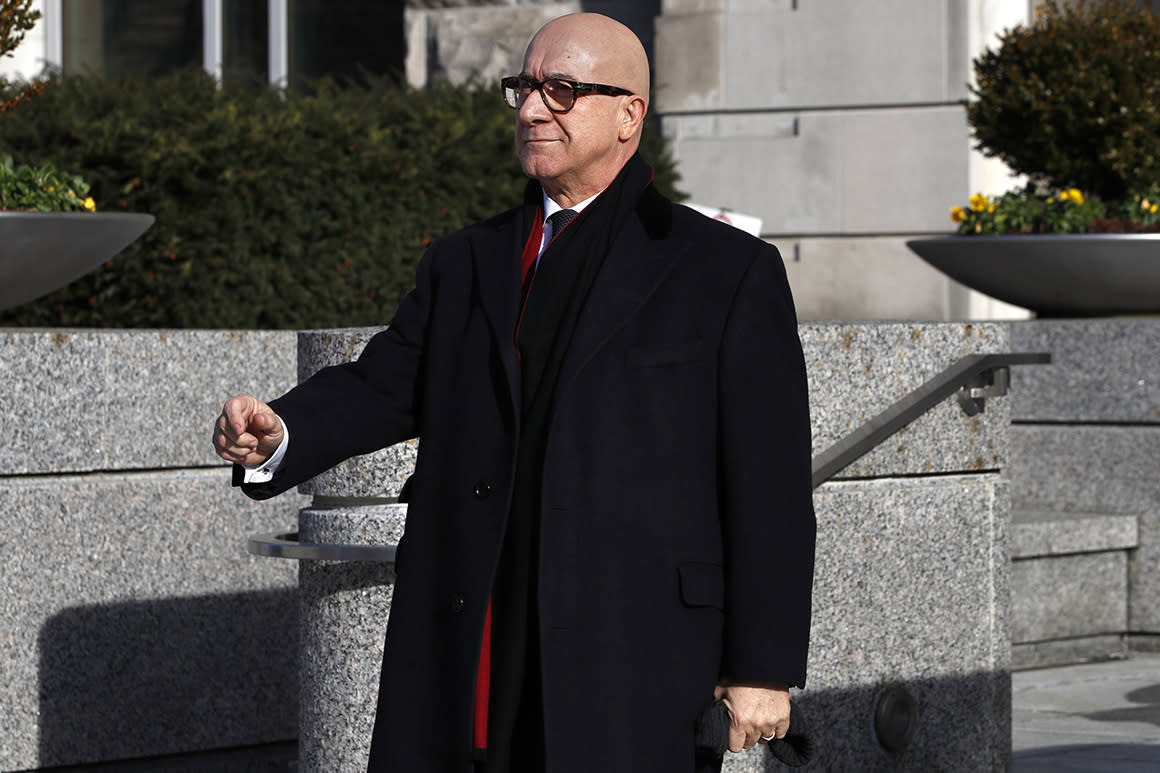Flynn partner wins new trial in foreign-agent case

- Oops!Something went wrong.Please try again later.
- Oops!Something went wrong.Please try again later.
A former business partner of President Donald Trump’s National Security Adviser Michael Flynn scored a major legal victory Friday as a federal judge ordered a new trial for the Iranian-born businessman on charges that he acted as an unregistered foreign agent for Turkey as Trump ran for president in 2016.
The ruling from U.S. District Court Judge Anthony Trenga in Alexandria, Va., was the latest lurch in a legal roller coaster ride for Bijan Rafiekian, who was found guilty by a jury following a 2019 trial then had his two felony convictions thrown out by Trenga only to see the guilty verdicts reinstated by an appeals court last March.
The decision from the Richmond-based 4th Circuit Court of Appeals rejected Trenga’s initial decision to toss out the jury verdicts, but left open a narrow path for Rafiekian to win a new trial. Trenga’s ruling Friday seized that opening, finding that the jury’s guilty verdicts were “against the great weight of the evidence “and should be set aside.
“Rafiekian’s convictions … are based on weak inferences, many built upon one another, drawn from narrowly framed circumstantial evidence, without regard to a broader context that substantially undercuts any inculpatory inferences,” wrote Trenga, an appointee of President George W. Bush. “The evidence as a whole allows only the weakest inference that Rafiekian had agreed to operate as a Turkish agent subject to its direction or control.”
During Rafiekian’s trial two-and-a-half years ago, prosecutors argued that while working at Flynn’s consulting firm Rafiekian arranged a $600,000 contract from a Dutch company that was essentially a front for the Turkish government. Under the pact, Flynn Intel Group agreed to produce research, generate publicity and lobby officials to take action against a Turkish-born cleric who went into exile in Pennsylvania in 1999, Fethullah Gülen.
Turkish President Recep Erdoğan has accused Gülen of backing attempted coups in Turkey and of establishing a network of followers who are undermining the state. For years, Erdoğan has unsuccessfully sought to persuade U.S. officials to expel Gülen or extradite him to face charges in Turkey.
Gülen, who lives in Pennsylvania, has denied any involvement in coup efforts.
In the ruling Friday, Trenga emphasized that working in parallel with a foreign government — and even coordinating some activities with that government — does not make one an agent of that government under U.S. law.
“A person must do more than act in parallel with a foreign government’s interest, pursue a mutual goal, or privately pledge personal alliance” to such a government, the judge wrote in his 51-page opinion.
Trenga also suggested that the government’s handling of Flynn’s role and of classified evidence about his dealings with Turkey had complicated Rafiekian’s trial and may have led jurors to infer Rafiekian’s guilt even though Flynn was not charged in the case.
In December 2017, Flynn pleaded guilty to a false-statement charge brought by Special Counsel Robert Mueller’s team. Under Flynn’s deal with the government, he agreed to cooperate with prosecutors and was promised he would not face charges in the Turkey-related probe.
Flynn was expected to be the star witness at Rafiekian’s trial, but the relationship between prosecutors and a new attorney for Flynn, Sidney Powell, grew acrimonious in the weeks before the trial. As a result, prosecutors changed course and dumped plans to call Flynn as a witness. They instead labeled him a co-conspirator, allowing some evidence of his dealings with Rafiekian to be admitted at trial.
“The Government’s relabeling of Flynn as a co-conspirator on the eve of trial was not based on any new evidence, but rather its assessment that Flynn’s testimony would not advance its case against Rafiekian,” Trenga wrote.
As the dispute with the government mushroomed, Flynn sought to back out of his guilty plea. A judge in Washington had not yet resolved that motion when Trump granted Flynn a full pardon a couple of weeks after the 2020 election.
Just before Rafiekian’s trial, prosecutors unveiled a summary of classified evidence that Turkey was working through Flynn to influence then-candidate Trump during the 2016 campaign.
The judge said the summary, which was read to jurors, could be fairly read either as helpful to Rafiekian’s case or as essentially neutral, since it said nothing about Rafiekian.
But Trenga indicated he was troubled that a prosecutor’s arguments about the summary seemed to turn the summary into a liability for Rafiekian.
Trenga’s decision isn’t binding on other judges, but if others follow his reasoning it could be harder for prosecutors to pursue similar cases against people working to achieve similar policy goals to foreign governments where evidence of explicit direction from those governments is murky.
Prosecutors now face a decision about whether to follow through with another trial for Rafiekian, drop the case, or seek relief again from the 4th Circuit. It’s unclear whether the appeals court would entertain such an effort given the present posture of the case.
Trenga set a hearing for April 20 to set a possible new trial date “should the United States elect to proceed with a new trial.”
A spokesperson for the U.S. Attorney’s Office in Alexandria did not respond to a message seeking comment on the decision. An attorney for Rafiekian declined to comment.

